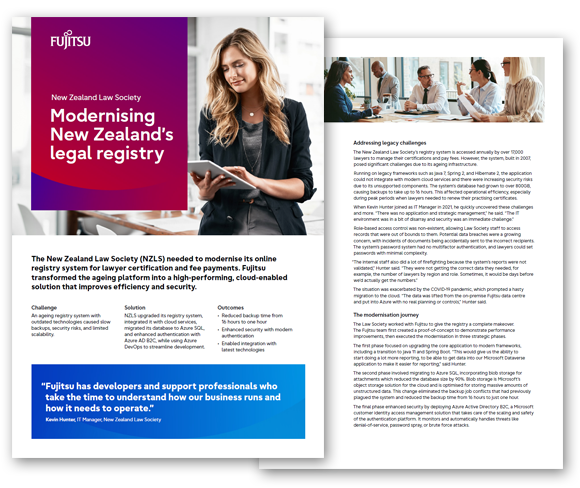New Zealand Law Society Modernising New Zealand’s legal registry

The New Zealand Law Society (NZLS) needed to modernise its online registry system for lawyer certification and fee payments. Fujitsu transformed the ageing platform into a high-performing, cloud-enabled solution that improves efficiency and security.
Challenges
An ageing registry system with outdated technologies caused slow backups, security risks, and limited scalability.
Solutions
NZLS upgraded its registry system, integrated it with cloud services, migrated its database to Azure SQL, and enhanced authentication with Azure AD B2C, while using Azure DevOps to streamline development.
Outcomes
-
Reduced backup time from 16 hours to one hour
- Enhanced security with modern authentication
-
Enabled integration with latest technologies
“Fujitsu has developers and support professionals who take the time to understand how our business runs and how it needs to operate.”
Kevin Hunter, IT Manager, New Zealand Law Society
94%
reduction in database backup time
17,000
lawyers supported
- Industry: Legal
- Location: New Zealand
- Customer's website

About the customer
The New Zealand Law Society (Te Kāhui Ture o Aotearoa), founded in 1869, is the national regulator of the legal profession in New Zealand. Headquartered in Wellington with 13 regional branches, NZLS provides support, training, and education to lawyers nationwide.
Throughout the project, Fujitsu employed Azure DevOps pipelines to streamline development and ensure quality through comprehensive performance testing. While the underlying technologies were overhauled, the user interface remained unchanged to avoid disrupting the established workflows of both internal and external users.
The implementation was carefully managed by Fujitsu to minimise the impact on daily operations. “The migration was well-managed and conducted outside of business hours, so there was no disruption for any user,” said Hunter.
The New Zealand Law Society’s registry system is accessed annually by over 17,000 lawyers to manage their certifications and pay fees. However, the system, built in 2007, posed significant challenges due to its ageing infrastructure.
Running on legacy frameworks such as Java 7, Spring 2, and Hibernate 2, the application could not integrate with modern cloud services and there were increasing security risks due to its unsupported components. The system’s database had grown to over 800GB, causing backups to take up to 16 hours. This affected operational efficiency, especially during peak periods when lawyers needed to renew their practising certificates.
When Kevin Hunter joined as IT Manager in 2021, he quickly uncovered these challenges and more. “There was no application and strategic management,” he said. “The IT environment was in a bit of disarray and security was an immediate challenge.”
Role-based access control was non-existent, allowing Law Society staff to access records that were out of bounds to them. Potential data breaches were a growing concern, with incidents of documents being accidentally sent to the incorrect recipients. The system’s password system had no multifactor authentication, and lawyers could set passwords with minimal complexity.
“The internal staff also did a lot of firefighting because the system’s reports were not validated,” Hunter said. “They were not getting the correct data they needed, for example, the number of lawyers by region and role. Sometimes, it would be days before we’d actually get the numbers.”
The situation was exacerbated by the COVID-19 pandemic, which prompted a hasty migration to the cloud. “The data was lifted from the on-premise Fujitsu data centre and put into Azure with no real planning or controls,” Hunter said.
The modernisation journey
The Law Society worked with Fujitsu to give the registry a complete makeover. The Fujitsu team first created a proof-of-concept to demonstrate performance improvements, then executed the modernisation in three strategic phases.
The first phase focused on upgrading the core application to modern frameworks, including a transition to Java 11 and Spring Boot. “This would give us the ability to start doing a lot more reporting, to be able to get data into our Microsoft Dataverse application to make it easier for reporting,” said Hunter.
The second phase involved migrating to Azure SQL, incorporating blob storage for attachments which reduced the database size by 90%. Blob storage is Microsoft’s object storage solution for the cloud and is optimised for storing massive amounts of unstructured data. This change eliminated the backup job conflicts that had previously plagued the system and reduced the backup time from 16 hours to just one hour.
The final phase enhanced security by deploying Azure Active Directory B2C, a Microsoft customer identity access management solution that takes care of the scaling and safety of the authentication platform. It monitors and automatically handles threats like denial-of-service, password spray, or brute force attacks.
Throughout the project, Fujitsu employed Azure DevOps pipelines to streamline development and ensure quality through comprehensive performance testing. While the underlying technologies were overhauled, the user interface remained unchanged to avoid disrupting the established workflows of both internal and external users.
The implementation was carefully managed by Fujitsu to minimise the impact on daily operations. “The migration was well-managed and conducted outside of business hours, so there was no disruption for any user,” said Hunter.
A future-ready platform in place
With the tight collaboration between Fujitsu and the Law Society, the three phases of the modernisation project were completed ahead of schedule.
“We saw a huge performance increase as soon as we moved over to the new server,” said Hunter. “Before the modernisation, the system would grind to a halt whenever the 17,000 lawyers tried to renew their certificates within the same few weeks. We haven’t seen a slowdown since the upgrade.”
Apart from the improved user experience, the Law Society’s system now generates accurate, timely reports using Power BI, eliminating previous challenges with data validation and accessibility.
The modernisation of the registry system has unlocked new capabilities for integration and data management. The Law Society can now leverage Microsoft Power Pages to create lawyer surveys, collect the responses, and analyse the data. Now, the registry integrates seamlessly with the Law Society’s content management system, powered by Dynamics 365.
As the Law Society prepares to launch a new lawyers’ membership system, the modernised registry will serve as a reliable single source of truth for lawyer data, ensuring consistency and accuracy across all systems.
“The Fujitsu team has given the Law Society a really high level of support,” Hunter said. “Fujitsu has developers and support professionals who take the time to understand how our business runs and how it needs to operate.”
Related Customer stories




